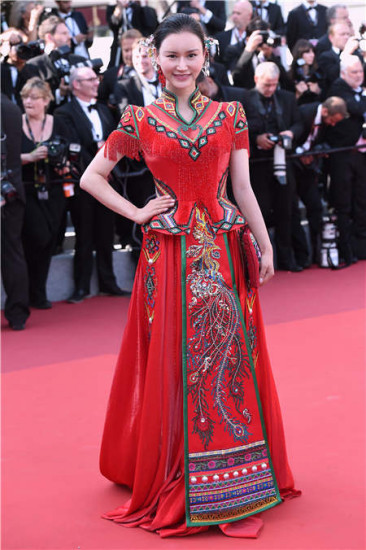
Deng Chaoyu clad in an embroidered gown on the red carpet of the Cannes film festival in May. (Photo provided to China Daily)
Chinese singer-songwriter Deng Chaoyu made a fashion statement on the red carpet at this year's Cannes Film Festival on May 28.
Instead of Western gowns that are seen on most female celebrities at the annual event, she wore a red dress with exquisite embroidery and silver jewelry handmade by members of her Tujia ethnic group.
The dress employed the 2,000-year-old weaving skill of the community, xi lan ka pu, which means "flowery blanket" in the Tujia language.
"This traditional skill is still used by the Tujia people. I just love everything about the place where I come from. It deserves a wide exposure," says Deng, who participated in the Belt and Road International Film Week Conference held during the festival in Cannes.
The dress also combines traditional elements in Tujia clothing, such as pleated skirts and colorful sequins.
In her early 30s, Deng grew up in Yichang in Central China's Hubei province, where the Tujia people live.
She learned guzheng at age 7 after being introduced to the Chinese zither by her mother. Both her mother and grandmother sing Tujia folk songs.
Since she graduated from the Central China Normal University in Wuhan in 2007, with majors in Chinese language and folk singing, Deng has been promoting the Tujia culture at home and abroad.
"I didn't feel the uniqueness of the Tujia community until I entered university, where students from around the country live and study together," Deng says. "I wore traditional clothes and accessories, and my classmates were very curious about my culture."
But Deng also realized that like many other traditional cultures in China, the Tujia heritage faces a decline in the face of modernization of the country.
Young members of the ethnic group are moving to big cities for jobs and gradually becoming part of the urban culture.
"Singing and dancing are related to most aspects of Tujia life. We sing and dance to mark events, such as birth, marriage, death or even building a new house," she says.
Deng came to Beijing to further her studies at the Communication University of China in 2007, when she met veteran Chinese musician Jin Tielin. She learned singing from him.
In her debut album, Tujia Girls, released in 2015, Deng brought in elements of Tujia folk music to express the sadness young women and their parents feel when brides depart their parental homes after marriage. She used the ba shan folk dance in the album, too.
In 2016, she held a charity concert in her hometown and raised more than 1 million yuan ($143,000) for poor families.
Deng will go back to Yichang along with a team to collect ancient Tujia songs, which will be used in a musical.
She also plans to make a movie on the origins of the Tujia people. Both the musical and the movie are scheduled to be released in 2018.
"I want to keep it alive and let it be seen by the world," she says of the Tujia heritage.


















































